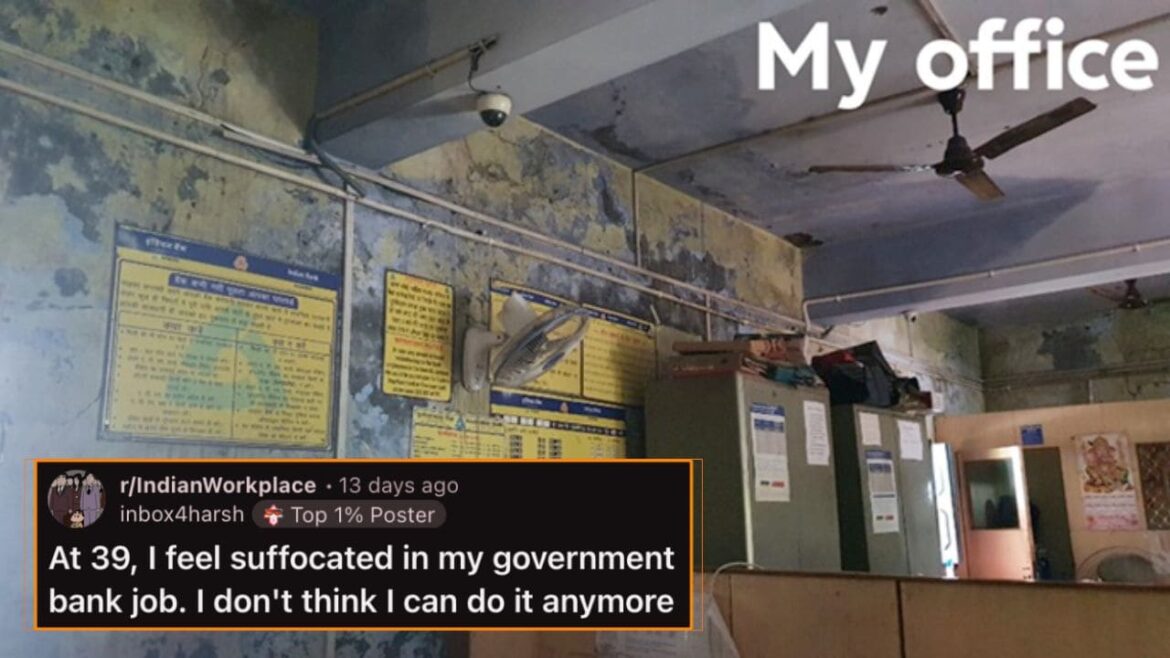A shocking story from Reddit has started a big conversation online about the real life of government bank employees. A 39-year-old banker, who worked for 15 long years in a Public Sector Bank (PSU), shared why he finally quit the job many people call “safe” and “prestigious.”
His detailed post has gone viral because it shows the hidden pressure, long hours, and emotional struggle behind a job that looks stable from the outside.
Government Bank Job: Respect Outside, Stress Inside
Prestige Comes With Heavy Pressure
In India, a PSU bank job is seen as a dream. Families encourage children to prepare for years, and cracking the exam feels like a big achievement. Government jobs bring respect, a steady salary, house allowances, and long-term benefits.
But the banker wrote that behind this respect was constant mental and physical stress. According to him, what looked stable from far away slowly became a burden with no peace.
The Banker Says Stress Became a Daily Reality
Long Hours, Endless Targets
According to the viral post, the banker worked almost every day from morning to late night, without proper breaks. He explained that even though banking is considered stable, the pressure of sales targets and relocation made life difficult.
He also shared that he was often forced to move to remote locations with very short notice, affecting his family life and health.
Health Problems Forced Him to Rethink Life
Impact on Body and Mind
The banker revealed that the job gave him high blood pressure, thyroid issues, and fatty liver problems. Stress became a part of his life, and he had no time for rest or recovery.
He said the pressure was not only about work but also about doing tasks he felt were unfair to the public, such as pushing unnecessary insurance products just to meet targets.
Moral Conflict Made the Situation Worse
“It Felt Like Losing Dignity”
One part of the post that hit many readers emotionally was when he wrote that he felt he was losing his self-respect. He claimed that he had to follow unreasonable instructions from seniors and stay silent even when things were wrong.
This moral pressure added to his burnout, making him question why he was continuing in the job.
The Breaking Point: Leaving a ‘Secure’ Job
He Could Not Continue Anymore
After years of pain, he finally stopped going to work. He admitted that the decision would affect his finances, but he believed that quitting was the only way to save his health and peace of mind.
His post ended with hope that leaving the job would help him rebuild his life and find a healthier future.
Netizens React: “This Happens Everywhere”
Many people in the comment section supported him and said that banking jobs have become extremely stressful in recent years. Some users compared it to the IT sector, sharing similar stories of burnout and imbalance.
Several current bank employees also agreed that long hours, endless sales targets, and lack of work-life balance are pushing many people to resign.
Conclusion
The viral post of this 39-year-old banker shows a harsh truth—government jobs may look safe, but they can also bring extreme pressure and affect personal health and happiness. His story has sparked a national discussion on mental health, work-life balance, and the need for better working conditions in banking.
It reminds us that stability is important, but peace of mind is priceless.
FAQs
What was the main reason the banker quit his job?
He left because of extreme burnout, long working hours, high stress, and health problems caused by the job.
Did he try to continue working?
Yes, he worked for 15 years, but eventually he felt he could not mentally or physically continue.
Are PSU bank jobs stressful?
Many employees say that today’s banking jobs come with intense targets, pressure, and long hours, making them stressful.
Why did his story go viral?
His honest and emotional post exposed the hidden side of government banking, which many people could relate to.
What did netizens say about his post?
Most people supported him, and many shared similar experiences of burnout in both banking and IT sectors.

